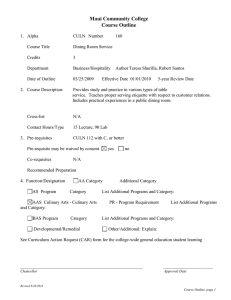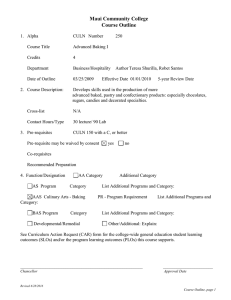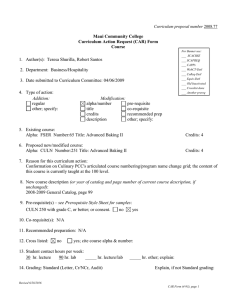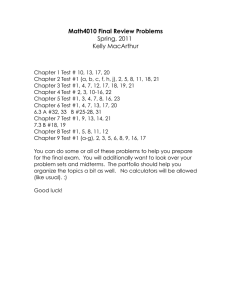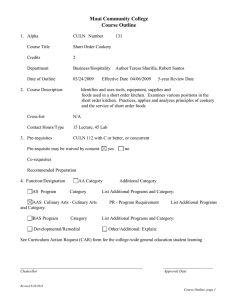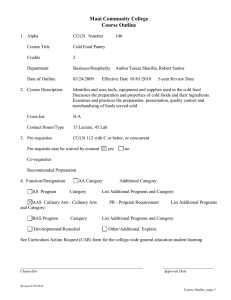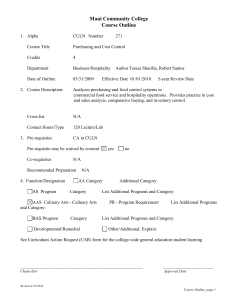2008.77 - Culinary Arts (CULN) 251: Advanced Baking II, Course Outline
advertisement
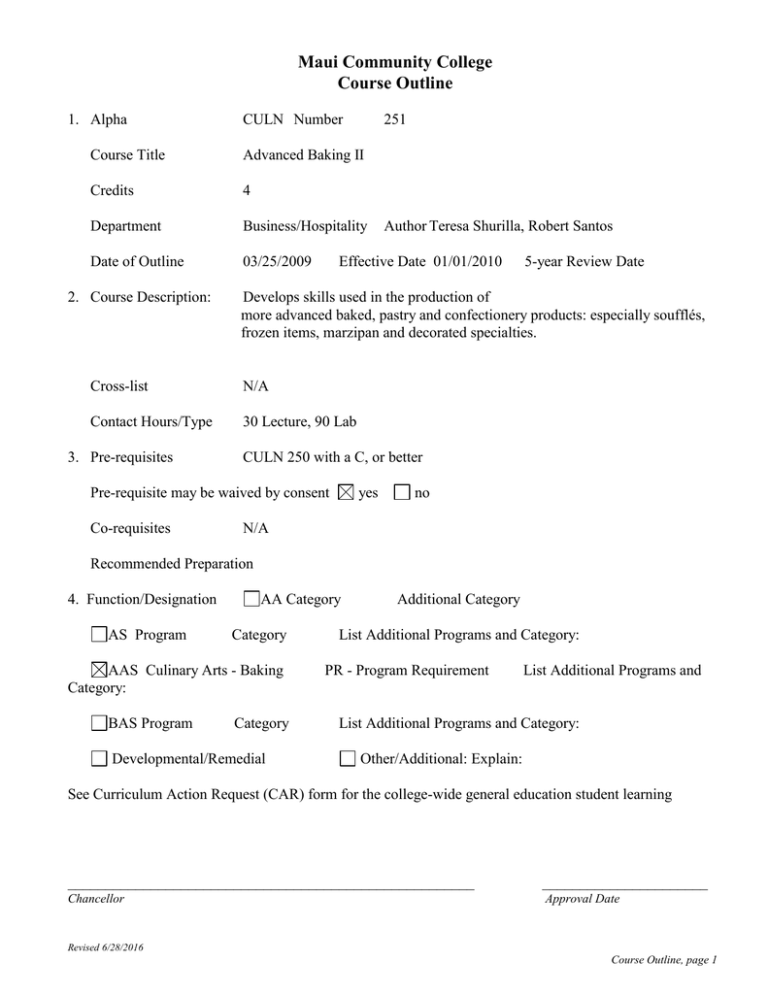
Maui Community College Course Outline 1. Alpha CULN Number 251 Course Title Advanced Baking II Credits 4 Department Business/Hospitality Date of Outline 03/25/2009 2. Course Description: Effective Date 01/01/2010 N/A Contact Hours/Type 30 Lecture, 90 Lab CULN 250 with a C, or better Pre-requisite may be waived by consent Co-requisites 5-year Review Date Develops skills used in the production of more advanced baked, pastry and confectionery products: especially soufflés, frozen items, marzipan and decorated specialties. Cross-list 3. Pre-requisites Author Teresa Shurilla, Robert Santos yes no N/A Recommended Preparation 4. Function/Designation AS Program AA Category Category AAS Culinary Arts - Baking Category: BAS Program Category Developmental/Remedial Additional Category List Additional Programs and Category: PR - Program Requirement List Additional Programs and List Additional Programs and Category: Other/Additional: Explain: See Curriculum Action Request (CAR) form for the college-wide general education student learning ______________________________________________________ ______________________ Chancellor Approval Date Revised 6/28/2016 Course Outline, page 1 2 outcomes (SLOs) and/or the program learning outcomes (PLOs) this course supports. This course outline is standardized and/or the result of a community college or system-wide agreement. Responsible committee: PCC 5. Student Learning Outcomes (SLOs): List one to four inclusive SLOs. For assessment, link these to #7 Recommended Course Content, and #9 Recommended Course Requirements & Evaluation. Use roman numerals (I., II., III.) to designate SLOs On successful completion of this course, students will be able to: I. Prepare a variety of plated desserts acceptable to industry standards II. Demonstrate the ability to plan, prepare and analyze bakery showpieces for display and buffet III. Discuss and prepare a variety of international and classical pastries and desserts IV. Prepare and demonstrate advanced confection techniques with regards to sugar and chocolate 6. Competencies/Concepts/Issues/Skills For assessment, link these to #7 Recommended Course Content, and #9 Recommended Course Requirements & Evaluation. Use lower case letters (a., b.…zz. )to designate competencies/skills/issues On successful completion of this course, students will be able to: a. b. c. d. e. f. g. prepare and analyze soufflés, mousses and dessert sauces; prepare and analyze frozen products – ice cream, sorbets, etc.; prepare and analyze classical desserts; prepare and analyze international pastries and breads; prepare and analyze sugar and chocolate products, various types of candies and marzipan; develop, practice and use advanced decorating techniques; prepare and analyze showpieces and desserts for buffets and displays. 7. Suggested Course Content and Approximate Time Spent on Each Topic Linked to #5. Student Learning Outcomes and # 6 Competencies/Skills/Issues 1 week Introduction and Orientation to the Laboratory Review of Weights and Measures Review of Tools and Equipment Review of Sanitation and Safety Procedures and Principles 1 week Ingredient Analysis and Review (a, b, c, d, e, f, g), (II, III, IV) 1 week Hot and Cold Soufflés, Mousses and Dessert Sauces (a), (I, III) 1 week Frozen Products (b), (I, III) Ice Creams, Sherbets, Sorbets, etc. (b), (I, III) 1 week Classical Desserts (a-g), (I, III, IV) 1 week International Pastries, Breads and Desserts (d), (I, III, IV) 3 weeks Sugar and Chocolate Products, Candies, Marzipan, etc. (e), (II, IV) Revised 6/28/2016 course outline 3 3 weeks Advanced Decorating Techniques (f), (II) 3 weeks Showpieces, Buffet Desserts and Displays (g), (II, IV) 8. Text and Materials, Reference Materials, and Auxiliary Materials Appropriate text(s) and materials will be chosen at the time the course is offered from those currently available in the field. Examples include: How Baking Works, Paula Figoni, Fourth Edition, John Wiley and Sons, INC; Chocolates and Confections, Peter P. Greweling, John Wiley and Sons, INC Appropriate reference materials will be chosen at the time the course is offered from those currently available in the field. Examples include: Appropriate auxiliary materials will be chosen at the time the course is offered from those currently available in the field. Examples include: DVD Ewald Notter Sugar and Advanced Sugar Series 9. Suggested Course Requirements and Evaluation Linked to #5. Student Learning Outcomes (SLOs) and #6 Competencies/Skills/Issues Specific course requirements are at the discretion of the instructor at the time the course is being offered. Suggested requirements might include, but are not limited to: 10-40% Written quizzes, midterm(s) and/or a final exam covering lectures, discussions, media presentations, lab activities, field trips, guest speakers, and reading assignments (a, b, c, d, e, f, g), (I-IV) 5-30% Lab practical exams and product identification and analysis (a-g), (I-IV) 0-20% Reading text and/or other assigned materials and answering discussion questions (a-g), (I-IV) 5-20% Participation in class discussions, group and individual reports (a-g), (I-IV) 10-40% Laboratory and field skills (a-g), (I-IV) 5-20% Field trip observations and reports (a-g), (I-IV) 10-20% Projects, reports, and/or Service-Learning (a-g), (I-IV) 5-10% Punctuality, attendance, cleanup and participation 10. Methods of Instruction Instructional methods will vary considerably by instructor. Specific methods are at the discretion of the instructor teaching the course and might include, but are not limited to: a. b. c. d. e. quizzes and other tests with feedback and discussion; field and lab practical exams and product identification and analysis; lectures and class discussions; problem solving; videos, DVDs, CD-ROMs with discussion questions; Revised 6/28/2016 course outline 4 f. lab activities including experiments, production, lab skill lessons, and other activities; g. field trips including field notes, activities, observations and reports; h. guest speakers; i. group activities; j. oral reports and other student presentations; k. simulations; l. homework assignments; m. web-based assignments and activities; n. reflective journals; o. group and/or individual research projects with reports or poster presentations; p. study logs and study groups; q. Service-Learning, community service, and/or civic engagement projects; and r. Other contemporary learning techniques (such as problem-based learning, investigative case-based learning, internships, self-paced programs, etc.) 11. Assessment of Intended Student Learning Outcomes Standards Grid attached 12. Additional Information: Revised 6/28/2016 course outline
